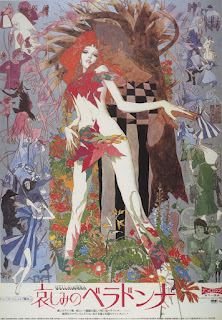Belladonna of Sadness (1973)
Japanese animation has been a part of current pop culture since the late 1980s, but it has been around for much longer. One example in the late 1960s and early 1970s was Mushi Production. Unfortunately, their movies fell into the wrong circuits outside of Japan, giving them a reputation that a lot of anime had early on. The problem is a much of that reputation was deserved.
Belladonna of Sadness was the last of a loose trilogy of films directed by Eiichi Yamamoto, this particular one based on a 19th century book Jules Michelet called La sorcière. The book itself was a sympathetic account of oppression of women as witches throughout the ages, as well as supporting it somewhat as a legitimate religion. It really doesn't have any narrative, but rather a number of stories about witch trials and oppression over the centuries.
Using this as inspiration Yamamoto along with Yoshiyuki Fukuda penned this tale of lovers, Jean (Katsuyuki Ito) and Jeanne (Aiko Nagayama), a young couple living in a village in pre-Revolutionary France. They wish to marry, but the local lord (Masaya Takahashi) demands a payment of 10 cows for a marriage tax, when Jean can only afford one. Jeanne begs the Lord's Mistress (Shigako Shimegi) for mercy, and she agrees to waive the tax - in exchange for her husband exercising droit de seigneur and allowing a number of other upper echelon townspeople to have at her as well.
Raped and humiliated, Jeanne returns to a frigid Jean, but is visited that night by the Devil (Tatsuya Nakadai) who has is way with her physically before promising to give her power if she will give herself over to him. She eventually gets what she desires, but as usual when dealing with the Devil there is a cost.
The one thing I do have to say is that I like most of the artwork done here, which often is still watercolors rather than actual animation. The animated parts range from the traditional to the psychedelic, but they are quite imaginatively handled. There is a ridiculous scene at one point that appears to combine whimsical contemporary animation (it looks like some of the stuff done for Bonzo Dog Band). There are also a number of graphic scenes of various sex acts and scenes meant merely to shock, like animals being excreted from various orifices.
And that brings me to the problem with this film. A large part of the third act shows an all-out daisy chain of an orgy with about everything possible being inserted into everything possible. This wouldn't be so much of a problem if it had anything to do with the plot. I know that there is probably some excuse about "sexual awakening," but that makes it even more problematic, as Jeanne's sexual awakening is in fact relinquishing all power, body and soul, to a phallic Devil that has raped and humiliated her as much as the townspeople have.
The first two thirds of the movie leading up to this is her getting raped, gaining a little power, falling out of favor and getting either humiliated or raped again. In some manner it appears that the filmmakers were trying to make a rather progressive statement (for the 1970s, and for Japan) about how women were oppressed throughout the ages and how this comes from denying them their sexuality. Knowing that at least one early released version of the film contained interludes of filmed footage of people engaging in sex acts in a park, and also that some of the more misogynistic aspects of the movie were removed in the late 1970s as this was occasionally shown on college campuses, opens up the question about whether a feminist veneer was placed over a fetish film.
As beautiful and creative as the animation is the obsession with humiliating Jeanne, whether it be to make a pro-feminist film or a cartoon roughie, becomes too much and makes the whole thing borderline unwatchable. This is sad as there was some obvious work done on it, and it has a great soundtrack. It could have worked as twisted, psychedelic fairy tale, but unfortunately just comes across as a crass piece of erotica.
Belladonna of Sadness (1973)
Time: 86 minutes
Starring: Tatusya Nakadai, Aiko Nagayami
Director: Eiichi Yamamoto




Comments
Post a Comment